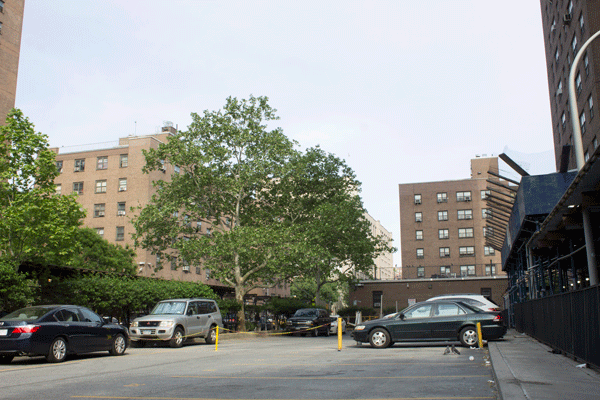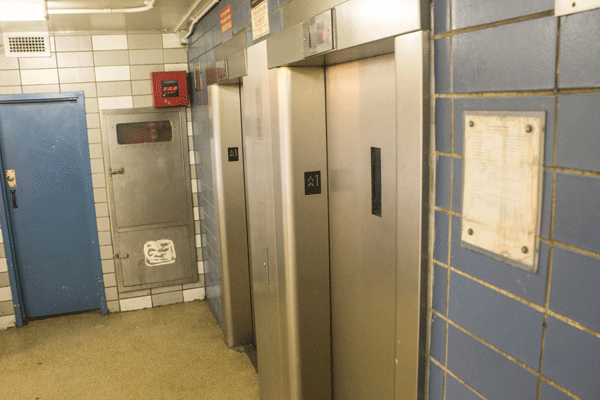
BY ZACH WILLIAMS | Mayor Bill de Blasio plans to transform the New York City Housing Authority (NYCHA) by streamlining operations, raising tenant fees, shifting funding and seeking partnerships with private developers.
The authority’s finances have deteriorated, with nearly $17 billion in outstanding repairs among its 334 housing developments and an overall $1 billion loss in operating revenue since 2001.Years of divestment by the state and federal governments necessitates that the city makes its own way in ensuring the financial future of NYCHA which comprises about eight percent of the city’s rental housing, said De Blasio at a May 19 press conference announcing a plan called “Next Generation NYCHA.”
“This is, at this moment, the worst financial crisis in the history of NYCHA. That’s what these years of disinvestment have taken us to. And I say that with pain,” he said according to a transcript.
He added that his administration has already taken several measures to relieve some pressure from authority finances by not requiring NYCHA to pay for police services nor taxes to the city. About $300 million in capital funds were committed for capital repairs and safety. The plan aims to save $4.6 billion in repair needs over the next decade, according to de Blasio.
“So we’re going from an organization that’s one month away from going over the edge, in terms of its expense budget, to one that, over the next decade, will produce a $230 million surplus,” he added.
There are 15 elements of the plan organized into four overall goals: achieving financial stability, operational efficiency, building and maintaining affordable housing, and improving services for tenants.
NYCHA will make efforts to improve its rent collection rate from its current level of about 75 percent. Parking at developments will increase towards market rates. Tenants concerns will now be processed via 311 as part of the process of shifting 10,000 NYCHA employees to other city agencies. About 13,000 units of new housing will arise, most of which are intended to be nearly 100 percent affordable housing — while some will have market-rate tenants in order to raise revenue for the authority.
New partnerships among city agencies and community groups will allow the authority to concentrate more on its core mission of housing provision rather than social services, according to the plan.
The location of the new developments will be announced in August. There is hope that a new building with more than 3,000 units will come to Fulton Houses (btw. W. 16th & 18th Sts., Ninth & 10th Aves.) atop a current parking lot after a decade-long effort. How that building would benefit the development as a whole could be key to garnering community support.
“I don’t want it to be something where you build on our property… and there is no return on the development itself,” said Miguel Acevedo, president of the Fulton Houses Tenants Association, in a telephone interview.
Other local public housing residents meanwhile expressed their own optimism that any plan which would shake up the status quo at the Authority is welcome. The current backlog of apartment repairs often means that tenants wait years for non-emergency repairs. Plumbing leaks, ceiling cracks, warped floors and stubbornly slow elevator services are part of the public housing experience, according to residents. In a repair-economy of scarcity, the most persistent most often prevail, according to Fulton Houses resident Amalia Rodriguez.

“It’s a long time unless you really put up a fight about it,” she said.
Even when repairs are made, they are often shoddy, she added. A troublesome doorknob would sometimes lock her out while at other times lock her inside the apartment where she lives. A pipe mended with electrical tape failed anew. Persistent mildew afflicts the Chelsea-Elliot Houses (btw. W. 25th & 27th Sts., Ninth & 10th Aves.) Longtime resident Juan Tejada said through an interpreter meanwhile that he prevailed in getting a new tiled floor for his apartment. But it was not quite what he expected. The repairman utilized an array of differently shaped and colored tiles to do the job, Tejada said.
Feelings that NYCHA residents are not getting their due have not escaped the notice of Councilmember Corey Johnson who expressed support in a statement for the plan.
“NYCHA residents have been treated like second-class citizens for too long. No tenant should have to wait several months or longer for basic repairs. No child should have to play on broken playgrounds and no senior should have to walk on cracked pavement,” he said.
Some residents do their own repairs, though. When a toilet broke, Chelsea-Elliot Houses resident Chris Bautist said he called a plumber friend rather than sacrifice several days waiting for a NYCHA-appointed repairman who would only come at an unspecified time within an eight-hour window. But management is not the only problem, he added. Fellow residents should take better care of their homes and community facilities alike, according to Bautist — who swore that this would be the last year he manages a community garden there, because of all the garbage residents throw onto it from their residential windows.
But don’t do your own repairs at Baruch Houses in the East Village, residents warn. Such initiative can result in grudges from management who nonetheless do not like residents to complain too much, said longtime resident James Johnson.
The housing project has seen better days — 60 percent of NYCHA buildings are more than 50 years old — yet the management system should be better despite the difficulties currently afflicting the authority, Johnson added.
“It needs help,” he said.


































